
Measures to Maintain Regular Blood Pressure
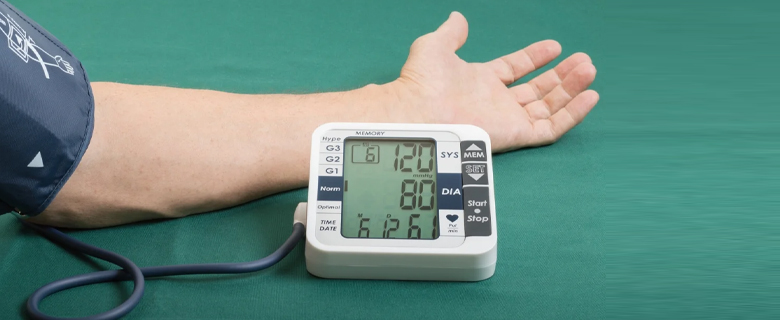
Table of Contents
What Is High Blood Pressure?
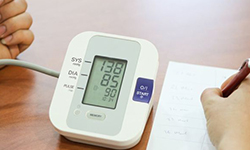
The ideal blood pressure (measured in millimeters of mercury or mm Hg) is under 120/80 mm Hg. The first number indicates systolic blood pressure or the pressure your heart exerts on the walls of your arteries when it beats. The second number indicates diastolic blood pressure or the pressure your heart exerts when it relaxes between the beats.
Uncontrolled or untreated hypertension can be quite risky. It can cause severe damage to the vital organs of your body such as heart and arteries (increased chances of heart attack & heart failure), kidneys (impaired functioning of kidneys and chances of kidney failure), brain (impeded brain function, which can cause stroke or dementia) and eyes (blurred or damaged vision).
One of the main reasons why hypertension goes undetected for a long period is that there are no visible symptoms of high blood pressure. As a result, most people suffering from it have no idea they have it! The only way to find out if you have high blood pressure is to get it checked from the doctor.
There’s also a condition known as Prehypertension or elevated blood pressure, in which blood pressure level is higher than normal but not high enough to be considered as hypertension. In such a case, doctors recommend some lifestyle changes that may help maintain blood pressure at a normal level.
Effective Measures To Maintain Regular Blood Pressure
- Eat Fresh Fruits & Vegetables –
Fresh fruits and vegetables have vital minerals and vitamins that are essential to keep blood pressure in check. They also help prevent heart diseases and other illnesses. Eat at least half a plate of vegetables or fruits in every meal or at least four to five servings daily. Many doctors recommend the DASH (Dietary Approaches to Stop Hypertension) diet to hypertension patients. In addition to fruits and vegetables, the diet also recommends other healthy foods such as whole grains, nuts, low-fat dairy products and lean meats that help lower blood pressure.
- Limit Salt Intake –
Salt contains sodium. Higher sodium intake means extra fluid in the body, which means more pressure on the blood vessels and kidneys. So make sure that your salt intake per day is between 1500 – 2300 mg. Avoid items that have high salt content in them, such as processed, packaged and frozen foods (chips, pretzels, canned soups, deli meats, cookies etc.).
- Watch The Measuring Scale –
Obesity or being overweight have a direct impact on the risk of developing prehypertension and subsequently high blood pressure. When your body carries more weight, more blood is required to supply oxygen to the body, which exerts more pressure on the arteries and increases blood pressure. The key to maintaining normal blood pressure is to maintain weight within a healthy range. If you notice the weighing scale leaning towards the higher side, or over your target range, lose weight the right way by eating healthy and exercising regularly. Also, check your weight regularly to ensure you don’t go off target.
- Say No To Smoking –
Every cigarette puff raises the blood pressure temporarily. Smoking and tobacco consumption are two of the biggest risks for developing high blood pressure, as the chemicals in both can slowly damage arteries by making them narrower. Passive smoking is equally dangerous. So either encourage the smokers around you to quit or stay away from them. Also, smoking hurts the overall health in the long term and puts you at higher risk for heart attack and stroke.
- Avoid (Or At Least Limit) Alcohol –
Regular heavy drinking can cause a long-term blood pressure rise as well as reduction in the effectiveness of blood pressure medications. Even having three drinks in one sitting can cause a temporary rise in blood pressure. So drinkers should keep their drinking to moderate levels (one drink for women and two for men).
- Maintain A Regular Workout Schedule –
Just as weight control is beneficial in controlling blood pressure levels, a regular fitness schedule (at least 30 -40 minutes of active exercise per day such as running, jogging, cycling, swimming etc.) can make the heart strong and lower blood pressure. Just 2.5 hours of moderate exercise that gets the heart pumping (like brisk walking) each week is a good starting goal. For people with normal blood pressure, a dedicated fitness regimen will help maintain the normal blood pressure levels.
- Manage Stress Levels –High levels of stress can increase blood pressure levels. Learning how to relax and manage stress can not only improve your emotional and physical health, but it will also help to keep your blood pressure in check. Stress management techniques such as exercising, listening to music, yoga and meditation can create a sense of well-being and increase feel-good chemicals called endorphins, which can help lower blood pressure.
Note of caution: This article is for information purposes only. Always consult your doctor in case of any blood pressure or other health-related problems.
Disclaimer
The information contained in this article/s is to educate / spread awareness in relation to hypertension and other diseases to the public at large. The contents of this article/s are created and developed by BPinControl.in (“The Website”) through its authors, which has necessary, authorisations, license, approvals, permits etc to allow usage of this articles on The Website. The views and opinions expressed in this article are views, opinions of the respective authors and are independently endorsed by doctors. Although great care has been taken in compiling and checking the information in this article/s, The Website shall not be responsible, or in any way liable for any errors, omissions or inaccuracies in this article/s whether arising from negligence or otherwise, or for any consequences arising therefrom. The content of this article is not a substitute for any medical advice. The Website shall not be held responsible or liable for any consequence arising out of reliance on the information provided in the article.

 Fresh fruits and vegetables have vital minerals and vitamins that are essential to keep blood pressure in check. They also help prevent heart diseases and other illnesses. Eat at least half a plate of vegetables or fruits in every meal or at least four to five servings daily. Many doctors recommend the DASH (Dietary Approaches to Stop Hypertension)
Fresh fruits and vegetables have vital minerals and vitamins that are essential to keep blood pressure in check. They also help prevent heart diseases and other illnesses. Eat at least half a plate of vegetables or fruits in every meal or at least four to five servings daily. Many doctors recommend the DASH (Dietary Approaches to Stop Hypertension) 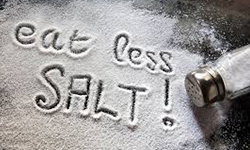 Salt contains sodium. Higher sodium intake means extra fluid in the body, which means more pressure on the blood vessels and kidneys. So make sure that your salt intake per day is between 1500 – 2300 mg. Avoid items that have high salt content in them, such as processed, packaged and frozen foods (chips, pretzels, canned soups, deli meats, cookies etc.).
Salt contains sodium. Higher sodium intake means extra fluid in the body, which means more pressure on the blood vessels and kidneys. So make sure that your salt intake per day is between 1500 – 2300 mg. Avoid items that have high salt content in them, such as processed, packaged and frozen foods (chips, pretzels, canned soups, deli meats, cookies etc.).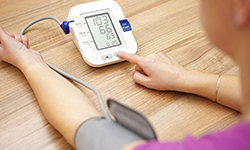 Obesity or being overweight have a direct impact on the risk of developing prehypertension and subsequently high blood pressure. When your body carries more weight, more blood is required to supply oxygen to the body, which exerts more pressure on the arteries and increases blood pressure. The key to maintaining normal blood pressure is to maintain weight within a healthy range. If you notice the weighing scale leaning towards the higher side, or over your target range, lose weight the right way by eating healthy and exercising regularly. Also, check your weight regularly to ensure you don’t go off target.
Obesity or being overweight have a direct impact on the risk of developing prehypertension and subsequently high blood pressure. When your body carries more weight, more blood is required to supply oxygen to the body, which exerts more pressure on the arteries and increases blood pressure. The key to maintaining normal blood pressure is to maintain weight within a healthy range. If you notice the weighing scale leaning towards the higher side, or over your target range, lose weight the right way by eating healthy and exercising regularly. Also, check your weight regularly to ensure you don’t go off target. Every cigarette puff raises the blood pressure temporarily. Smoking and tobacco consumption are two of the biggest risks for developing high blood pressure, as the chemicals in both can slowly damage arteries by making them narrower. Passive smoking is equally dangerous. So either encourage the smokers around you to quit or stay away from them. Also, smoking hurts the overall health in the long term and puts you at higher risk for heart attack and stroke.
Every cigarette puff raises the blood pressure temporarily. Smoking and tobacco consumption are two of the biggest risks for developing high blood pressure, as the chemicals in both can slowly damage arteries by making them narrower. Passive smoking is equally dangerous. So either encourage the smokers around you to quit or stay away from them. Also, smoking hurts the overall health in the long term and puts you at higher risk for heart attack and stroke. Regular heavy drinking can cause a long-term blood pressure rise as well as reduction in the effectiveness of
Regular heavy drinking can cause a long-term blood pressure rise as well as reduction in the effectiveness of  Just as weight control is beneficial in controlling blood pressure levels, a regular fitness schedule (at least 30 -40 minutes of active exercise per day such as running, jogging, cycling, swimming etc.) can make the heart strong and lower blood pressure. Just 2.5 hours of moderate exercise that gets the heart pumping (like brisk walking) each week is a good starting goal. For people with normal blood pressure, a dedicated fitness regimen will help maintain the normal blood pressure levels.
Just as weight control is beneficial in controlling blood pressure levels, a regular fitness schedule (at least 30 -40 minutes of active exercise per day such as running, jogging, cycling, swimming etc.) can make the heart strong and lower blood pressure. Just 2.5 hours of moderate exercise that gets the heart pumping (like brisk walking) each week is a good starting goal. For people with normal blood pressure, a dedicated fitness regimen will help maintain the normal blood pressure levels.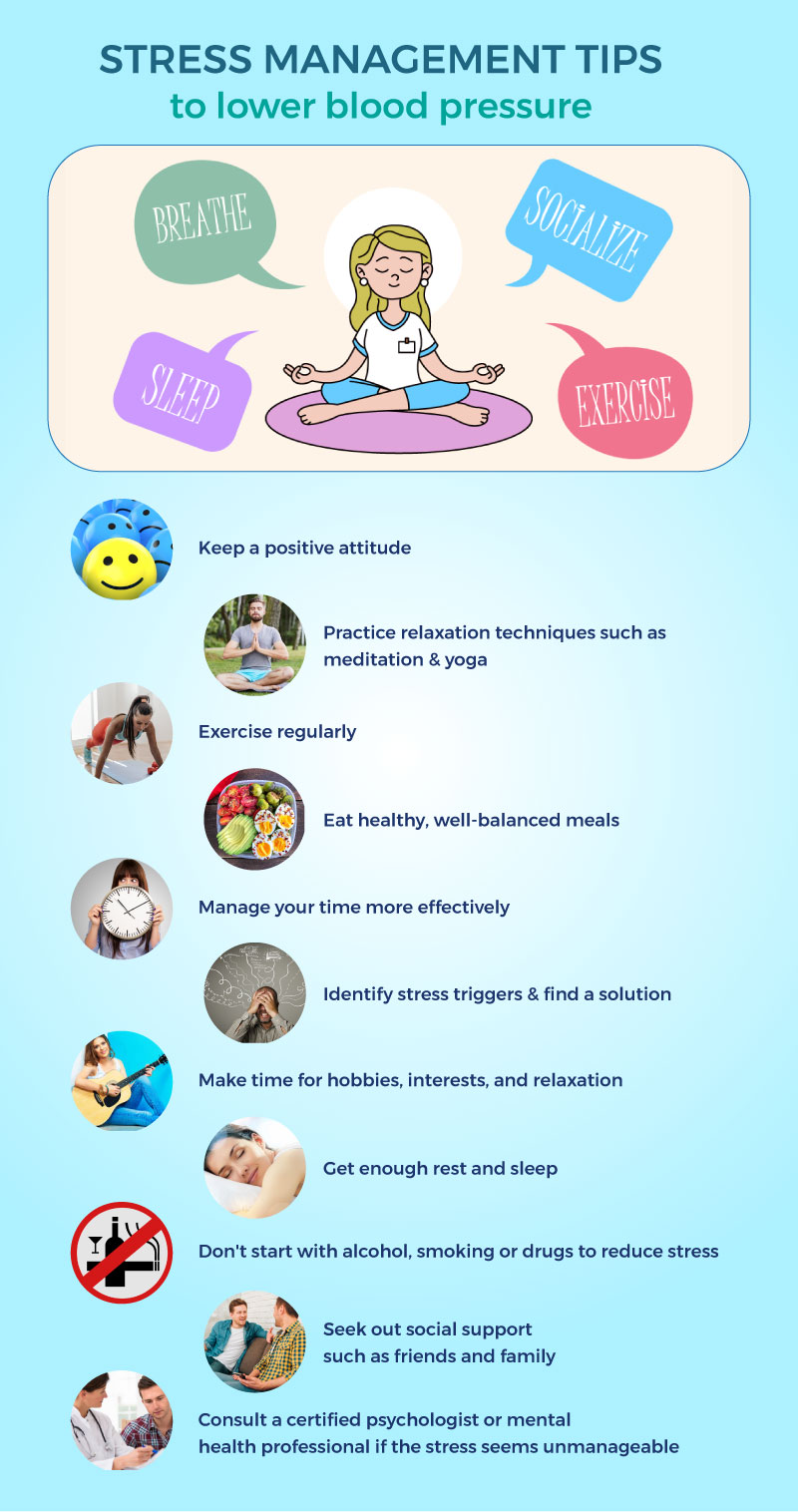

Comments (0)
No comments found.Add your comment